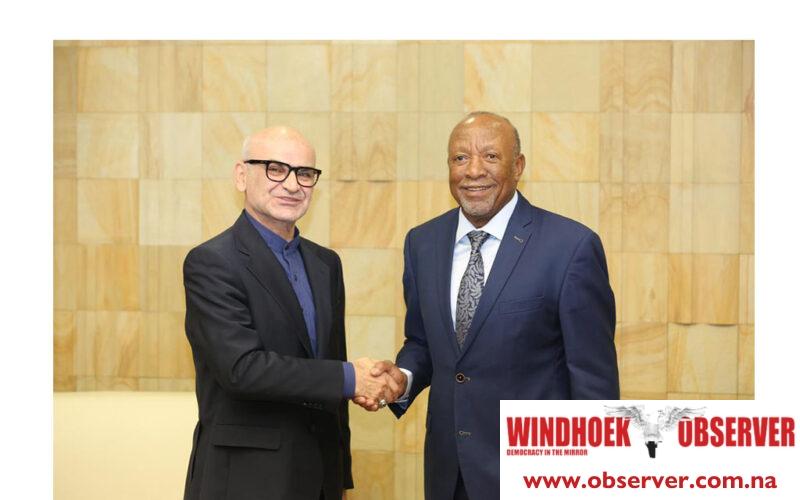Niël Terblanché
In a new development, the country has received an offer of assistance from Iran to help mitigate the impacts of the severe drought following a recently declared state of emergency.
The offer was made during a courtesy call by Dr. Seyed Ali Sharifi Sadati, the Ambassador of Iran to Namibia, to President Nangolo Mbumba at State House on Wednesday.
Ambassador Sadati highlighted Iran’s advanced technologies in water infrastructure and earth dam construction, expressing readiness to support Namibia’s efforts in these areas. This comes at a critical time as Namibia and the broader Southern African Development Community (SADC) region brace for severe drought conditions.
Iran’s assistance comes at a crucial time, offering Namibia a pathway to reinforce its infrastructure, secure food and water resources, and develop its oil and gas industry, ensuring a brighter and more resilient future for its people.
“Iran has advanced capabilities in water preservation and is prepared to assist Namibia, especially in the northern regions where floods frequently exacerbate water scarcity issues,” Ambassador Sadati said.
He also pointed out several opportunities for Namibians to study at Iran’s advanced universities, which offer various fields of study that could benefit the country’s development.
President Mbumba welcomed the support and added that the opportunities presented by the Iranian government are timely, given the looming drought.
“Strengthening our excellent bilateral relations, which date back to the pre-independence era, remains crucial for the prosperity of both nations,” he said.
In addition to addressing the drought crisis, Iran’s offer extends to assisting Namibia in developing its burgeoning oil and gas sector.
Namibia has made substantial discoveries in the Orange Basin, which could potentially transform it into a major oil producer by the 2030s. The country hopes to begin oil production by 2029, following the Venus discovery, and by 2030, following the Graff discovery, with the Kudu gas field expected to go online in 2028.
Ambassador Sadati emphasised Iran’s extensive experience in oil and gas development as a valuable asset for Namibia.
“Iran’s accumulated expertise in oil and gas can significantly aid Namibia in managing its recent discoveries and ensuring sustainable development,” he said.
The Ambassador also offered resources from its seventeen agricultural centres to help Namibia achieve food security and combat the persistent droughts.
To ensure the sustainable management of the economic benefits from its natural resources, the country is actively working to establish effective petroleum revenue management legislation.
This includes setting up a sovereign wealth fund to secure revenue for future generations, ensuring long-term economic stability.
Iran’s comprehensive support, spanning water preservation, education, agriculture, and oil and gas development, presents a multifaceted opportunity for Namibia to enhance its capacity to manage and capitalise on its resources.
This cooperation could play a fundamental role in ensuring Namibia’s economic growth and stability amid the challenges posed by climate change and resource management.
During the Iranian Ambassador’s visit to State House, President Mbumba used the opportunity to personally express his heartfelt condolences on behalf of the Namibian people following the tragic death of President Ebrahim Raisi.




